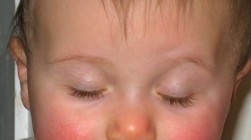Deafness and hearing impairment
WHAT ARE DEAFNESS AND HEARING IMPAIRMENT?
Hea ring impairment is a broad term used to describe the loss of hearing in one or both ears.
ring impairment is a broad term used to describe the loss of hearing in one or both ears.
+ Infectious diseases such as meningitis, measles, mumps and chronic ear infections can lead to hearing impairment, mostly in childhood, but also later in life.
+ The use of ototoxic drugs at any age, including some antibiotic and anti-malarial drugs, can cause damage to the cochlea (the hearing organ in the inner ear).
+ Head injury or injury to the ear can cause hearing impairment.
+ Wax or foreign bodies blocking the ear canal can cause hearing loss at any age.
+ Excessive noise, including working with noisy machinery, exposure to loud music or other loud noises, such as gunfire or explosions, can damage the inner ear and weaken hearing ability.
+ As people age, accumulated exposure to noise and other factors may lead to hearing impairment or deafness.
Hea
 ring impairment is a broad term used to describe the loss of hearing in one or both ears.
ring impairment is a broad term used to describe the loss of hearing in one or both ears. There are different levels of hearing impairment:
+ Hearing impairment refers to complete or partial loss of the ability to hear from one or both ears. The level of impairment can be mild, moderate, severe or profound;
+ Deafness refers to the complete loss of ability to hear from one or both ears.
+ Hearing impairment refers to complete or partial loss of the ability to hear from one or both ears. The level of impairment can be mild, moderate, severe or profound;
+ Deafness refers to the complete loss of ability to hear from one or both ears.
There are two types of hearing impairment, defined according to where the problem occurs:
+ Conductive hearing impairment, which is a problem in the outer or middle ear. This type of hearing problem is often medically or surgically treatable, if there is access to the necessary services; childhood middle ear infection is the most common example;
+ Sensorineural hearing impairment, which is usually due to a problem with the inner ear, and occasionally with the hearing nerve going from there to the brain. This type of hearing problem is usually permanent and requires rehabilitation, such as with a hearing aid. Common causes are excessive noise and ageing.
+ Conductive hearing impairment, which is a problem in the outer or middle ear. This type of hearing problem is often medically or surgically treatable, if there is access to the necessary services; childhood middle ear infection is the most common example;
+ Sensorineural hearing impairment, which is usually due to a problem with the inner ear, and occasionally with the hearing nerve going from there to the brain. This type of hearing problem is usually permanent and requires rehabilitation, such as with a hearing aid. Common causes are excessive noise and ageing.
CAUSES OF HEARING IMPAIRMENT AND DEAFNESS
Deafness can be inherited: if one or both parents or a relative is born deaf, there is a higher risk that a child will be born deaf.
+ Hearing impairment may also be caused before or during birth for several reasons.
Deafness can be inherited: if one or both parents or a relative is born deaf, there is a higher risk that a child will be born deaf.
+ Hearing impairment may also be caused before or during birth for several reasons.

These include:
+ Premature birth;
+ Conditions during birth in which a baby lacks enough oxygen to breathe;
+ Rubella, syphilis or certain other infections in a woman during pregnancy;
+ The use of ototoxic drugs - a group of more than 130 drugs (such as the antibiotic gentamicin) that can cause damage to the inner ear if incorrectly given - during pregnancy;
+ Jaundice, which can damage the hearing nerve in a newborn baby.
+ Premature birth;
+ Conditions during birth in which a baby lacks enough oxygen to breathe;
+ Rubella, syphilis or certain other infections in a woman during pregnancy;
+ The use of ototoxic drugs - a group of more than 130 drugs (such as the antibiotic gentamicin) that can cause damage to the inner ear if incorrectly given - during pregnancy;
+ Jaundice, which can damage the hearing nerve in a newborn baby.
+ Infectious diseases such as meningitis, measles, mumps and chronic ear infections can lead to hearing impairment, mostly in childhood, but also later in life.
+ The use of ototoxic drugs at any age, including some antibiotic and anti-malarial drugs, can cause damage to the cochlea (the hearing organ in the inner ear).
+ Head injury or injury to the ear can cause hearing impairment.
+ Wax or foreign bodies blocking the ear canal can cause hearing loss at any age.
+ Excessive noise, including working with noisy machinery, exposure to loud music or other loud noises, such as gunfire or explosions, can damage the inner ear and weaken hearing ability.
+ As people age, accumulated exposure to noise and other factors may lead to hearing impairment or deafness.








